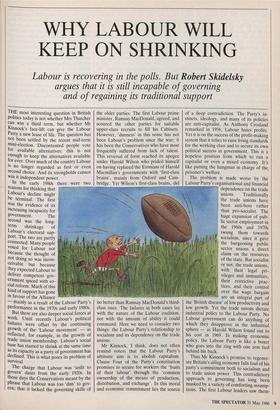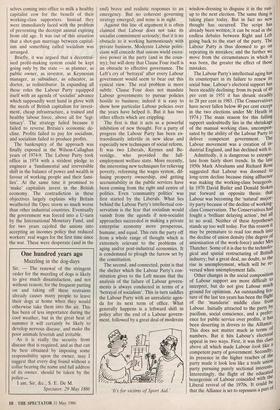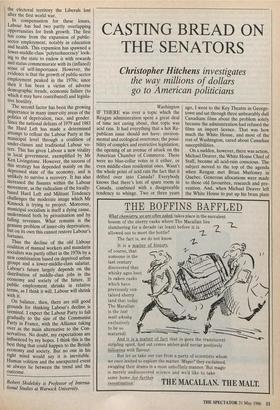WHY LABOUR WILL KEEP ON SHRINKING
Labour is recovering in the polls. But Robert Skidelsky
argues that it is still incapable of governing and of regaining its traditional support
THE most interesting question in British politics today is not whether Mrs Thatcher can win a third term, but whether Mr Kinnock's face-lift can give the Labour Party a new lease of life. The question has not been settled by the recent mid-term mini-election. Discontented people vote for available alternatives: this is not enough to keep the alternatives available for ever. Over much of the country Labour is no longer regarded as first or even second choice. And its strongholds cannot win it independent power. In the early 1980s there were two reasons for thinking that Labour's decline might be terminal. The first was the evidence of its increasing incapacity for government. The second was the long- term shrinkage of Labour's electoral sup- Port. The two are partly connected. Many people voted for Labour not because the thought of not doing so was incon- ceivable but because they expected Labour to deliver competent gov- ernment spiced with so- But there are also deeper social forces at work. Until recently Labour's political failures were offset by the continuing growth of the 'Labour movement' — as reflected, for example, in the growth of trade union membership. Labour's social base has started to shrink at the same time as its capacity as a party of government has declined. This is what poses its problem of survival.
The charge that Labour was 'unfit to govern' dates from the early 1920s. In those days the Conservatives meant by the phrase that Labour was too 'dim' to gov- ern; that it lacked the governing skills of the older parties. The first Labour prime minister, Ramsay MacDonald, agreed, and scoured the other parties for suitable upper-class recruits to fill his Cabinets. However, 'dimness' in this sense has not been Labour's problem since the war; it has been the Conservatives who have most frequently suffered from lack of talent. This reversal of form reached its apogee under Harold Wilson who prided himself on having replaced the Etonians of Harold Macmillan's governments with 'first-class brains', mainly from Oxford and Cam- bridge. Yet Wilson's first-class brains, did no better than Ramsay MacDonald's third- class ones. The failures in both cases lay with the nature of the Labour coalition, not with the amount of ability it could command. Here we need to consider two things: the Labour Party's relationship to socialism and its dependence on the trade unions.
Mr Kinnock, I think, does not often remind voters that the Labour Party's ultimate aim is to abolish capitalism. Clause Four of the Party's constitution promises to secure for workers the 'fruits of their labour' through the 'common ownership of the means of production, distribution, and exchange'. In this moral and economic commitment lies the source of a deep contradiction. The Party's in- stincts, ideology, and many of its policies are anti-capitalist. As Anthony Crosland remarked in 1956, Labour hates profits. Yet it is on the success of the profit-making system that it relies to raise living standards for the working class and to secure its own political success in government. This is a hopeless position from which to run a capitalist or even a mixed economy. It's like putting the hangman in charge of the prisoner's welfare.
The problem is made worse by the Labour Party's organisational and financial dependence on the trade unions. Traditionally the trade unions have been anti-boss rather than pro-socialist. The huge expansion of pub- lic sector employment in the 1960s and 1970s swung them towards socialism, since it gave the burgeoning public sector unions a direct claim on the resources of the state. But socialist or not, the trade unions, with their legal pri- vileges and immunities, their restrictive prac- tices, and their control over the wage bargain are an integral part of the 'British disease' of low productivity and low growth. Yet the trade unions dictate industrial policy to the Labour Party. No Labour government can do anything of which they disapprove in the industrial sphere — as Harold Wilson found out to his cost in 1969. In making economic policy, the Labour Party is like a boxer who goes into the ring with one arm tied behind his back.
Thus Mr Kinnock's promise to regener- ate Britain's ailing economy falls foul of his party's commitment both to socialism and to trade union power. This contradictory approach to governing has long been masked by a variety of comforting assump- tions. The first Labour leaders saw them- selves coming into office to milk a healthy capitalist cow for the benefit of their working-class supporters. Instead they were immediately faced with the problem of preventing the decrepit animal expiring from old age. It was out of this situation that a shot-gun marriage between capital- ism and something called socialism was arranged.
Briefly, it was argued that a decentral- ised profit-making system could be kept going only by the state — as planner, as public owner, as investor, as Keynesian manager, as subsidiser, as educator, as doctor, as redistributor. In expanding all these roles the Labour Party equipped itself with an agenda of 'socialist' advance which supposedly went hand in glove with the needs of British capitalism for invest- ment, cheap infrastructure, a trained and healthy labour force, above all for 'legi- timacy'. The strategy failed because it failed to reverse Britain's economic de- cline. Profits failed to pay for socialism, and socialism failed to produce profits.
The bankruptcy of the approach was finally exposed in the Wilson-Callaghan years of 1974-9. The Labour Party took office in 1974 with a strident pledge to engineer a 'fundamental and irreversible shift in the balance of power and wealth in favour of working people and their fami- lies'. At the same time it promised to `make' capitalists invest in the British economy. The contradiction in these objectives largely explains why Britain weathered the Opec storm so much worse than other industrial countries. Eventually the government was forced into a U-turn by the International Monetary Fund, and for two years cajoled the unions into accepting an incomes policy that reduced workers' real wages for the first time since the war. These were desperate (and in the end) brave and realistic responses to an emergency. But no coherent governing strategy emerged; and none is in sight.
Against this line of argument it is often claimed that Labour does not take its socialist commitment seriously; that it is no obstacle to it working harmoniously with private business. Moderate Labour politi- cians will concede that unions wield exces- sive power in the party (and in the coun- try); but will deny that Clause Four itself is an obstacle to effective governance. The Left's cry of 'betrayal' after every Labour government would seem to bear out this cynical view. The real problem is more subtle. Clause Four does not mandate Labour governments to pursue policies hostile to business; indeed it is easy to show how particular Labour policies over the years have helped it. But it has two other effects which are crippling.
The first is that it acts as a powerful inhibition of new thought. For a party of progress the Labour Party has been ex- traordinarily infertile in new ideas and especially new techniques of social reform. It was two Liberals, Keynes and Be- veridge, who provided the full- employment welfare state. More recently, the interesting new techniques for relieving poverty, reforming the wages system, dif- fusing property ownership, and getting accountability in the public services have been coming from the right and centre of politics. Even 'community politics' was first started by the Liberals. What lies behind the Labour Party's intellectual con- servatism is the fear that socialism would vanish from the agenda if non-socialist approaches succeeded in making a private enterprise economy more prosperous, humane, and equal. This cuts the party off from a whole range of thought which is extremely relevant to the problems of aging and/or post-industrial economies. It is condemned to plough the furrow set by the constitution.
The second, and connected, point is that the shelter which the Labour Party's con- stitution gives to the Left means that the analysis of the failure of Labour govern- ments is always conducted in terms of a `betrayal of socialism'. This in turn saddles the Labour Party with an unrealistic agen- da for its next term of office. What generally happens is a leftward shift in policy after the end of a Labour govern- ment, followed by a great deal of moderate `It's for victims of Sport Aid.' window-dressing to disguise it in the run- up to the next election. The same thing is taking place today. But in fact no new thought has occurred. The script has already been written; it can be read in the endless debates between Right and Left going back to the start of the party. The Labour Party is thus doomed to go on repeating its mistakes; and the further we move from the circumstances in which it was born, the greater the effect of those mistakes.
The Labour Party's intellectual aging has its counterpart in its failure to renew its social base. Labour's electoral support has been steadily declining: from its peak of 49 per cent in 1951 it has shrunk steadily to 28 per cent in 1983. (The Conservatives have never fallen below 40 per cent except in the two elections under Mr Heath in 1974.) The main reason for this falling support undoubtedly lies in the shrinkage of the manual working class, uncompen- sated by the ability of the Labour Party to deliver competent government. The Labour movement was a creation of in- dustrial England, and has declined with it.
Admittedly, it is dangerous to extrapo- late from fairly short trends. In the late 1950s Mark Abrahams and Richard Rose suggested that Labour was doomed to long-term decline because rising affluence was making the working-class bourgeois. In 1970 David Butler and Donald Stokes put forward an opposite thesis: that Labour was becoming the 'natural' major- ity party because of the decline of working- class Conservatism. The Conservatives had fought a 'brilliant delaying action', but all to no avail. Neither of these hypotheses stands up too well today. For this reason it may be premature to read too much into the decline of union density (the degree of unionisation of the work-force) under Mrs Thatcher. Some of it is due to the technolo- gical and spatial restructuring of British industry; but a great deal, no doubt, to the rise in unemployment, which will be re- versed when unemployment falls. Other changes in the social composition of Labour support are more difficult to interpret, but do not give Labour much ground for optimism. An outstanding fea- ture of the last ten years has been the flight of the 'mandarin' middle class from Labour. Initially attracted to the party by pacifism, social conscience, and a prefer- ence for public service over profits, it has been deserting in droves to the Alliance. This does not matter much in terms 01, numbers. But it hits Labour's electoral appeal in two ways. First, it was this class above all which made Labour look like a competent party of government. Secondly, its presence in the higher reaches of the party made it look less like a trade union party pursuing purely sectional interests. Interestingly, the flight of the educated bourgeoisie of Labour coincided with the Liberal revival of the 1970s. It could be L that the Alliance is set to repossess a pa °I
the electoral territory the Liberals lost after the first world war.
In compensation for these losses, Labour has had two partly overlapping opportunities for fresh growth. The first has come from the expansion of public- sector employment, notably in education and health. This expansion has spawned a lower-middle-class `polytechnocracy' look- ing to the state to endow it with rewards and status commensurate with its (inflated) sense of self-importance. However, the evidence is that the growth of public-sector employment peaked in the 1970s; since then it has been a victim of adverse demographic trends, economic failure (to which it may have contributed) and legisla- tive hostility. The second factor has been the growing importance in many inner-city areas of the politics of deprivation, race, and gender. Since the national defeats of 1979 and 1983 the Hard Left has made a determined attempt to refloat the Labour Party at the municipal level through a coalition of under-classes and traditional Labour vo- ters. This has given Labour a new vitality in local government, exemplified by Mr Ken Livingstone. However, the success of this strategy has depended mainly on the depressed state of the economy, and is unlikely to survive a recovery. It has also increased the fissures within the Labour movement, as the radicalism of the locally- based Hard Left and Militant Tendency challenges the moderate image which Mr Kinnock is trying to project. Moreover, municipal socialism is itself a dying cause, undermined both by privatisation and by falling revenues. What remains is the genuine problem of inner-city deprivation; but on its own this cannot restore Labour's fortunes.
Thus the decline of the old L'abour coalition of manual workers and mandarin socialists was partly offset in the 1970s by a new combination based on deprived urban groups and a lower-middle-class salariat.
Labour's future largely depends on the distribution of middle-class jobs in the economy and society of the future. If public employment shrinks in relative terms, as I think it will, Labour will shrink with it.
On balance, then, there are still good grounds for thinking Labour's decline is terminal. I expect the Labour Party to fall gradually to the size of the Communist Party in France, with the Alliance taking over as the main alternative to the Con- servatives. No doubt, my expectations are influenced by my hopes. I think this is the best thing that could happen to the British economy and society. Out no one in his right mind would say it is inevitable. Human volition and the unexpected event as always lie between the trend and the outcome.
Robert Skidelsky is Professor of Interna- tional Studies at Warwick University.




























































 Previous page
Previous page